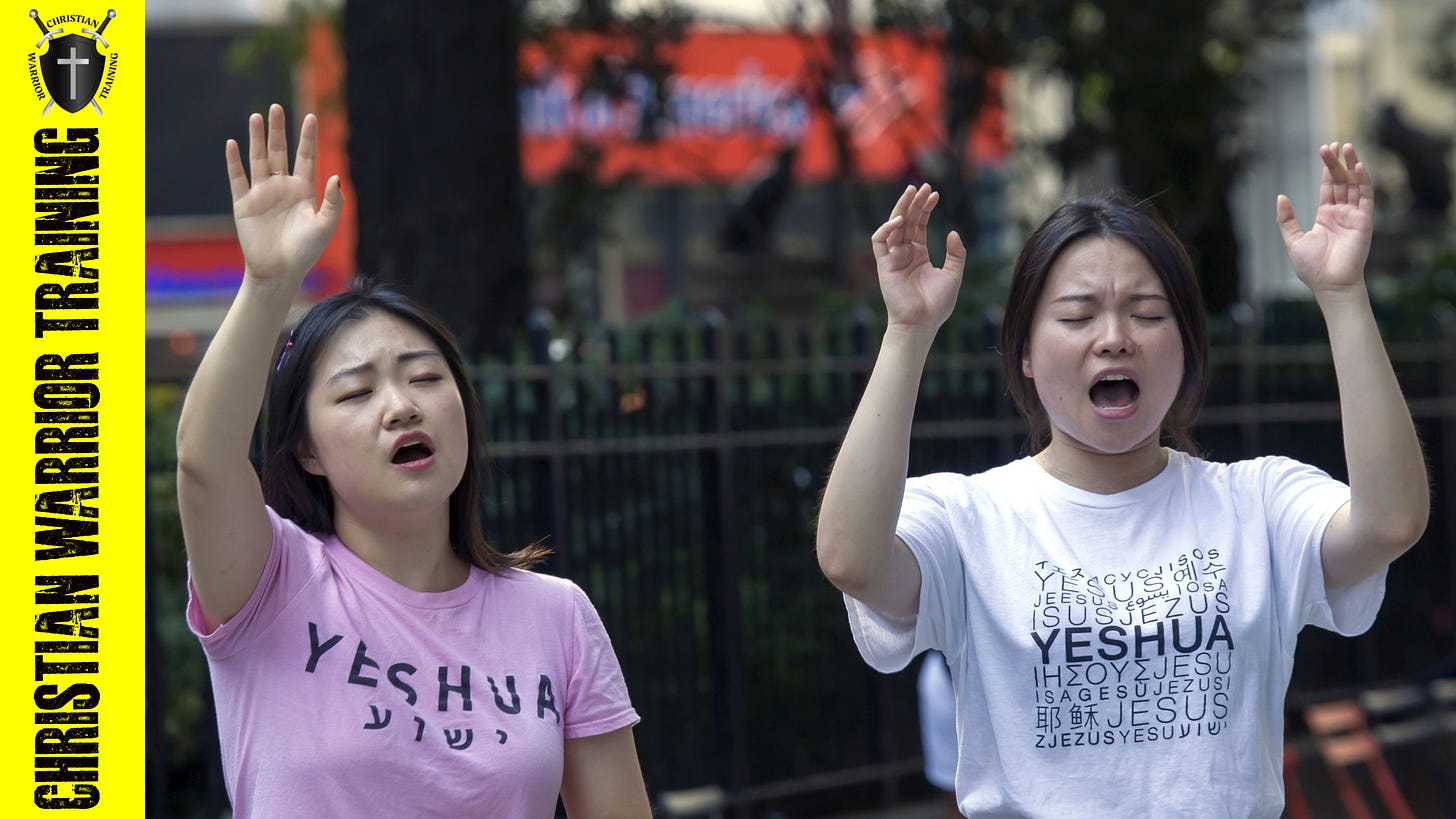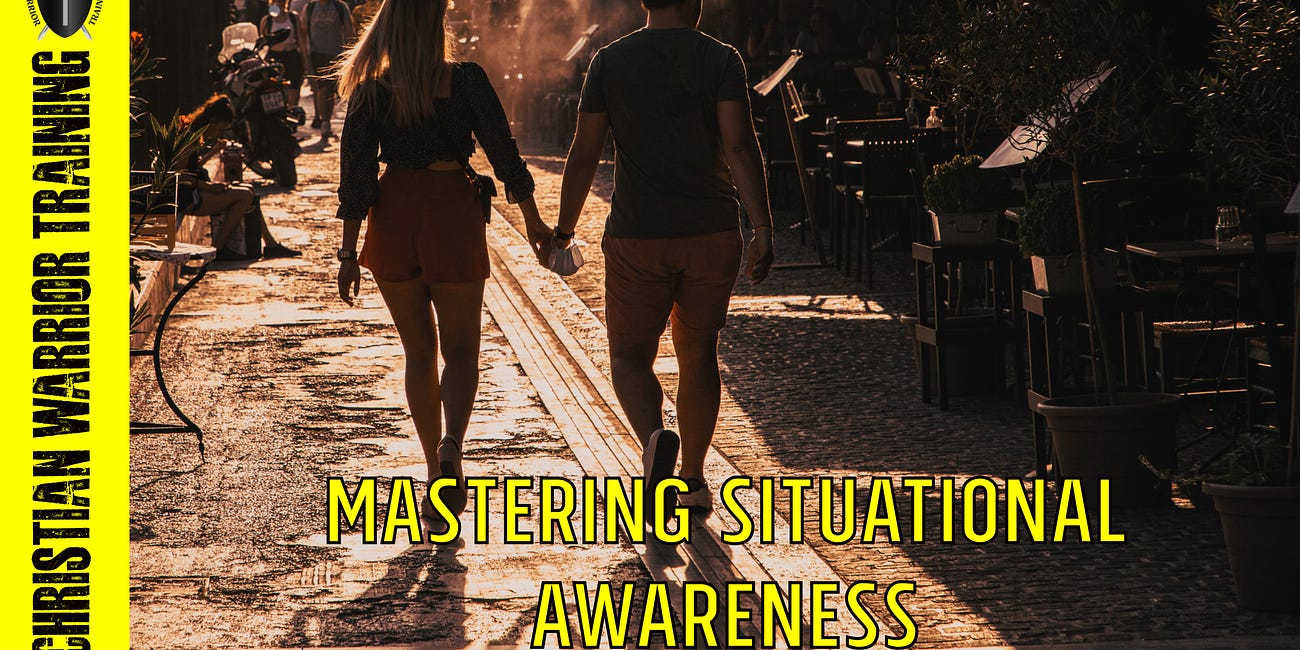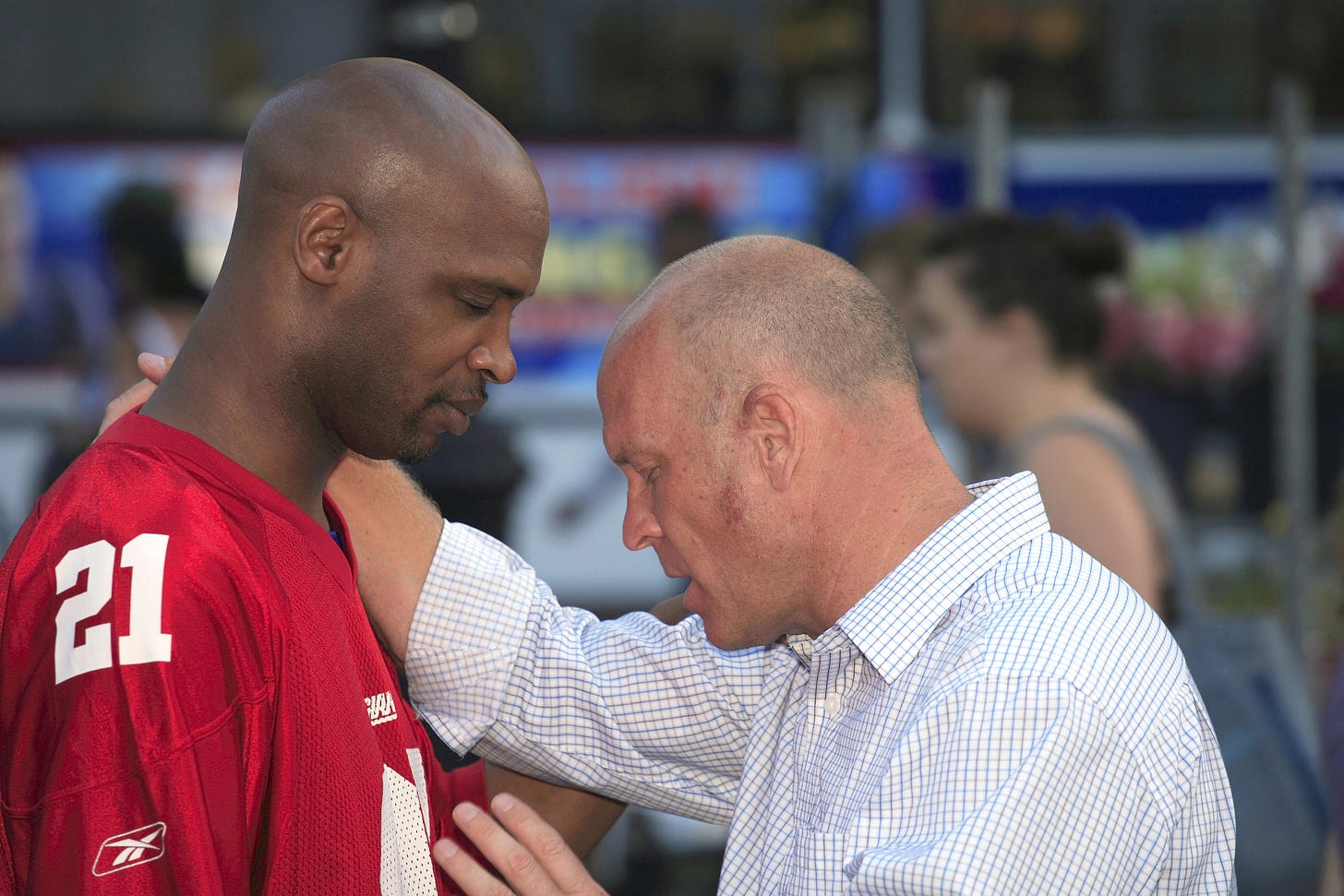
Street preaching, also known as street evangelism, is a powerful method of sharing the Gospel with those who might not otherwise hear it. It allows you to reach people in their everyday environments, spreading the message of Christ outside the walls of the church. However, it comes with unique challenges and risks that require careful preparation and awareness. This article provides practical safety tips for street preachers, ensuring that your evangelistic efforts are both effective, safe and secure.
Importance of Situational Awareness When Street Preaching
1 Peter 5:8 - "Be alert and of sober mind. Your enemy the devil prowls around like a roaring lion looking for someone to devour."
Being aware of your surroundings is crucial for staying safe while street preaching. Situational awareness involves constantly observing your environment, identifying potential threats, and being prepared to react appropriately.
When you're out spreading the Gospel, it's essential to observe the people around you and their behaviors. Pay attention to body language and actions that might indicate agitation or aggression. Identifying these signs early can help you avoid confrontations and keep your focus on your message.
Choosing the right location is also vital. Stay in well-lit, populated areas where there is a steady flow of people. These environments not only provide a safer setting but also increase your visibility and the likelihood of engaging with a larger audience. Avoid isolated or poorly lit areas, especially at night, as these can pose significant safety risks.
Minimizing distractions is another key aspect of situational awareness. While it might be tempting to use loud music to attract attention, it can impair your ability to notice potential threats. Stay focused on your surroundings and keep conversations with others brief and relevant to your mission. By staying alert and aware, you can prevent many potential dangers and ensure that your street preaching efforts are both safe and impactful.
Always Street Preach with a Partner
Ecclesiastes 4:9-10 - "Two are better than one, because they have a good return for their labor: If either of them falls down, one can help the other up."
Having a partner while street preaching provides an additional layer of safety and support, both practically and spiritually. When you have someone with you, it not only deters potential aggressors but also ensures that you have help readily available in case of any emergencies or challenging situations.
Firstly, a partner can watch your back, literally and figuratively. While you are focused on delivering your message, your partner can stay alert to the surroundings, keeping an eye out for any signs of trouble. This shared responsibility allows you to concentrate on preaching without the constant worry of monitoring every person and activity around you.
Moreover, a partner can provide immediate assistance if a situation escalates. Whether it’s helping to de-escalate a heated conversation or offering first aid in case of an injury, having someone by your side can make a significant difference in handling unexpected events. The presence of a partner can also dissuade potential attackers, as they are less likely to target a group than an individual.
Beyond the practical benefits, having a partner also offers emotional and moral support. Street preaching can be a challenging and sometimes discouraging task. A partner can provide encouragement, pray with you, and help maintain your spiritual focus. This companionship can make the experience more fulfilling and less daunting, knowing that you are not alone in your mission.
Choosing a reliable partner is essential. Look for someone who shares your commitment to evangelism and understands the risks involved. They should be trustworthy, able to remain calm under pressure, and supportive of your preaching style and message. With the right partner, your street preaching efforts can be more effective, safer, and spiritually enriching.
Choosing the Right Location
Matthew 10:16 - "I am sending you out like sheep among wolves. Therefore be as shrewd as snakes and as innocent as doves."
Selecting the right location for street preaching is a critical step that can significantly impact both your safety and the effectiveness of your evangelistic efforts. The location should not only be safe but also conducive to engaging with people and sharing the Gospel effectively.
Firstly, consider the visibility and accessibility of the location. Opt for places with a high foot traffic where people naturally congregate, such as busy street corners, parks, or near public transportation hubs. These areas provide a steady flow of passersby, increasing the likelihood that you will reach a larger audience. However, ensure that these locations are safe and well-lit, especially if you plan to preach in the evening.
Public spaces, such as parks or plazas, often provide a good balance between visibility and safety. These areas are usually monitored by local authorities, which can add an extra layer of security. Additionally, they offer ample space for people to gather and listen without causing obstruction or congestion.
Another important consideration is the legal aspect of your chosen location. Be aware of local laws and regulations regarding public speaking and gatherings. Some areas may require permits for public speaking or have restrictions on the use of amplification devices. Familiarize yourself with these rules to avoid any legal issues that could disrupt your evangelistic efforts. Being well-informed about your rights and responsibilities will help you navigate interactions with law enforcement and ensure that your activities are within legal boundaries.
If you are preaching in a high crime area, be sure to bring a partner whose only job is to watch your back. Although most criminals respect people who are preaching, those days are waning and I have seen a lack of respect of life for anyone recently.
Furthermore, consider the cultural and social context of the area. Some neighborhoods might be more receptive to street preaching than others. Understanding the local community's dynamics and respecting their norms and values can enhance the effectiveness of your message and reduce potential conflicts.
In summary, choosing the right location for street preaching involves a careful balance of visibility, safety, legal considerations, and cultural awareness. By being shrewd in your selection, as advised in Matthew 10:16, you can create an environment that maximizes your outreach potential while ensuring your safety and compliance with local regulations.
Traffic Safety When Street Preaching
When street preaching, it is crucial to consider traffic safety to ensure that your message reaches people without risking your well-being. Preaching in areas with high vehicle traffic can be dangerous if proper precautions are not taken. Here are some essential tips to stay safe around traffic while evangelizing.
Choose locations that are away from busy roads and intersections. People in cars cannot hear you preaching anyways. Opt for places such as sidewalks, parks, or pedestrian zones where you are not directly exposed to moving traffic. If you do find yourself near a road, position yourself at a safe distance from the curb.
It's also important to be mindful of distracted drivers. In today's world, many drivers are often distracted by their phones, GPS devices, or other in-car entertainment systems. This increases the risk of accidents, especially if they are not expecting pedestrians or street preachers in their path. Always be aware of your surroundings and watch for any vehicles that appear to be moving erratically or drivers who are not paying attention.
Additionally, setting up a physical barrier between yourself and the traffic can provide an extra layer of protection. This could be a portable barrier, a railing, or even positioning yourself behind a sturdy object like a bench or a planter. These barriers can prevent vehicles from accidentally or purposefully veering into your space and give you a visual boundary to stay within. In some cases, working with local authorities to temporarily set up barriers might be a possibility if you plan to preach in a particularly busy area.
Wearing high-visibility clothing can help drivers see you from a distance, especially during low-light conditions. Reflective vests or brightly colored attire can make you more noticeable and reduce the risk of being overlooked by passing drivers. This is particularly important if you are preaching in the early morning, late evening, or on cloudy days when visibility is naturally lower.
Finally, be proactive in looking for potential threats from traffic. Keep an eye out for vehicles that might be swerving, speeding, or driving too close to the sidewalk. If you notice any of these behaviors, move to a safer location immediately. It's always better to relocate than to risk a dangerous encounter with a vehicle.
By following these traffic safety tips, you can ensure that your street preaching efforts are conducted in a safe environment, allowing you to focus on spreading your message without undue risk.
Pre-Attack Indicators
Understanding and recognizing pre-attack indicators is crucial for maintaining safety while street preaching. By being aware of the signs that often precede aggressive behavior, you can take proactive steps to protect yourself and defuse potentially dangerous situations before they escalate.
One of the primary pre-attack indicators is a noticeable change in someone's body language. Aggressive individuals may exhibit certain physical signs such as clenching their fists, tensing their muscles, or pacing back and forth. These actions often indicate that a person is experiencing heightened emotions and may be preparing to act on them. If you observe someone exhibiting these behaviors, it is important to remain calm, create distance, and stay vigilant.
Facial expressions can also be a significant indicator of potential aggression. Look for signs of anger or hostility, such as a furrowed brow, glaring eyes, or a tight jaw. These expressions can signal that a person is becoming increasingly agitated. Responding with a calm and non-confrontational demeanor can help de-escalate the situation. Avoid making direct eye contact, which can be perceived as a challenge, and instead focus on keeping the atmosphere as calm as possible.
Verbal cues are another critical aspect of recognizing pre-attack indicators. Raised voices, aggressive language, or threatening statements are clear signs that someone may be preparing to escalate their behavior. It's important to listen carefully to what is being said and respond in a way that aims to defuse tension. Using a calm and soothing tone, acknowledging the person's feelings, and avoiding argumentative responses can help reduce the likelihood of a confrontation.
Additionally, watch for behavioral changes such as sudden movements or invading personal space. If someone moves quickly towards you or repeatedly steps into your personal space, these actions can be precursors to physical aggression. Maintaining a safe distance and positioning yourself so that you have an unobstructed path to exit the area can provide you with the necessary space to react if needed.
Environmental awareness is also key. Pay attention to the surroundings and the behavior of groups. Sometimes, individuals may act more aggressively when they are part of a group due to the influence of peer pressure. If you notice a group gathering and their behavior becoming more animated or focused on you, it might be wise to relocate to a safer area.
Finally, trust your instincts. If you have a gut feeling that something is not right, it is better to err on the side of caution. Your intuition can often pick up on subtle cues that might not be immediately obvious. If you feel uneasy or threatened, don't hesitate to remove yourself from the situation and seek help if necessary.
Recognizing these pre-attack indicators and knowing how to respond can significantly enhance your safety while street preaching. By staying aware and prepared, you can continue to share your message effectively while minimizing the risk of harm.
Avoiding Physical Attacks
While street preaching, it's crucial to take steps to avoid physical attacks, ensuring your safety and allowing you to focus on your message. Recognizing potential threats and employing strategies to de-escalate situations can prevent many confrontations from turning violent.
One of the key strategies in avoiding physical attacks is maintaining a safe distance from individuals who appear agitated or aggressive. This space acts as a buffer, giving you time to react if the situation escalates. If someone approaches you in a confrontational manner, take a step back to increase the distance and lower the tension. Position yourself in a way that allows for an easy exit, ensuring you can leave the area quickly if necessary.
Another important aspect is to stay calm and composed. Aggressive individuals often feed off heightened emotions, and responding with anger or fear can escalate the situation. Keep your voice steady and your demeanor non-threatening. Avoid making sudden movements, as these can be perceived as aggressive or defensive actions. Using open body language, such as keeping your hands visible and relaxed, can also help to defuse tension.
Verbal de-escalation techniques are invaluable in these situations. Speak in a calm, even tone, and try to acknowledge the other person's feelings without agreeing to any aggressive statements. Phrases like "I understand you're upset" or "Let's talk about this calmly" can help to soothe the individual and steer the conversation away from conflict. Avoid arguing or trying to prove a point, as this can further provoke aggression.
It's also helpful to be aware of your surroundings and potential escape routes. If you feel threatened, move towards a more populated area where there are other people around. This not only increases your safety but also provides witnesses who can help if needed. If you are near a building, know where the entrances and exits are in case you need to seek refuge quickly.
Using props can also act as a deterrent. Holding a sign or a megaphone not only helps to spread your message but can also create a physical barrier between you and potential aggressors. However, be mindful of the legalities surrounding the use of amplification devices, as mentioned previously.
If you are ever in a situation where you feel a physical attack is imminent, do not hesitate to call for help. Use your phone to contact local authorities or alert nearby bystanders. It's better to seek assistance early rather than waiting until the situation has escalated beyond control.
Being part of a group can significantly enhance your safety. As discussed earlier, having a partner or being part of a larger team can deter potential aggressors and provide mutual support. If possible, plan your street preaching activities with others who share your mission and commitment to safety.
Finally, consider taking a self-defense course tailored for non-violent conflict resolution. These courses teach you how to protect yourself without escalating violence and provide practical skills for handling aggressive encounters. Knowing basic self-defense techniques can give you confidence and help you stay calm under pressure.
By employing these strategies, you can minimize the risk of physical attacks and focus on your primary goal of sharing the Gospel.
Self-Defense Training
While the primary goal of street preaching is to share the Gospel, it is important to be prepared for situations that may require self-defense. Having basic self-defense skills can provide you with the confidence to handle aggressive encounters effectively and safely. Here are some key points to consider regarding self-defense training for street preachers.
Self-defense training should focus on non-violent conflict resolution and techniques that allow you to protect yourself without escalating the situation. Many self-defense courses emphasize the importance of awareness, de-escalation tactics, and practical skills to avoid physical confrontations. These courses are designed to equip you with the knowledge to stay safe and react appropriately if you are threatened.
One of the primary benefits of self-defense training is the ability to remain calm under pressure. Knowing that you have the skills to defend yourself can help you stay composed during tense situations. This composure can be critical in de-escalating conflicts and preventing violence. Many self-defense programs teach techniques such as verbal de-escalation, maintaining a non-threatening posture, and using confident body language to deter aggressors.
Basic self-defense techniques are another essential component of these training programs. Techniques such as blocking strikes, breaking free from grabs, and using leverage to subdue an attacker can be invaluable in protecting yourself. These techniques are often simple and easy to learn, making them accessible to people of all ages and physical abilities. The goal is not to engage in a fight but to create an opportunity to escape and seek help.
Legal considerations are also an important aspect of self-defense training. It is crucial to understand the laws regarding self-defense in your area to ensure that your actions are legally justified. Most self-defense courses provide information on the legal boundaries of using force in self-defense and emphasize the importance of using the minimum force necessary to protect yourself. This knowledge can help you navigate any legal issues that may arise from a self-defense incident.
Regular practice is essential to retain self-defense skills. Consider setting aside time to review and practice techniques periodically. This can be done individually or with a partner to simulate real-life scenarios. The more familiar you are with the techniques, the more effectively you will be able to use them if needed.
In addition to formal self-defense training, it is also beneficial to stay physically fit. Regular exercise can improve your strength, agility, and overall health, making it easier to defend yourself if necessary. Activities such as running, strength training, and flexibility exercises can all contribute to your physical preparedness. Essentially, be hard to kill.
Always remember that the primary objective of self-defense is to protect yourself and create an opportunity to escape. If you find yourself in a dangerous situation, prioritize getting to a safe location and seeking help. Self-defense should be a last resort, used only when other methods of de-escalation and avoidance have failed.
By incorporating self-defense training into your preparation for street preaching, you can enhance your safety and confidence while sharing the Gospel.
Handling Confrontational Individuals
When engaging in street preaching, it is inevitable that you will encounter individuals who disagree with your message and may become confrontational. Handling these situations with grace and composure is essential to maintaining your safety and the integrity of your mission. Here are some strategies for effectively managing confrontational individuals during your evangelistic efforts.
It is important to understand why people might become confrontational. Often, individuals who react aggressively to street preaching do so because they feel their beliefs or personal space are being challenged. Recognizing this can help you approach the situation with empathy and a desire to de-escalate rather than argue.
One of the most effective ways to handle confrontation is to remain calm and composed. When someone approaches you aggressively, take a deep breath and keep your tone of voice steady and non-threatening. Responding with anger or frustration will only escalate the situation. Instead, use a calm, even tone and maintain a relaxed body posture. This can help to diffuse the tension and show the other person that you are not a threat.
Listening actively to the individual can also be a powerful de-escalation tool. Allow them to express their feelings and grievances without interrupting. Often, people just want to be heard and acknowledged. After they have spoken, acknowledge their perspective without necessarily agreeing with it. Phrases like "I understand that you feel strongly about this" or "I hear what you're saying" can validate their feelings without compromising your message.
Avoid engaging in arguments or trying to "win" the conversation. Street preaching is not about debating or proving others wrong; it's about sharing your faith with love and respect. If the conversation becomes heated, gently steer it back to a more neutral topic or suggest taking a break. You can say something like, "I appreciate your passion, but let's take a moment to calm down."
Setting boundaries is also crucial. If someone is being verbally abusive or making threats, it is okay to end the interaction. Politely but firmly let them know that you will not continue the conversation if they cannot remain respectful. For example, "I want to have a constructive dialogue, but I cannot continue if you are going to be disrespectful."
In some cases, it might be necessary to remove yourself from the situation altogether. If you feel that the confrontation could escalate to physical violence, prioritize your safety. Move to a more populated area or seek assistance from nearby bystanders or authorities. Trust your instincts; if a situation feels unsafe, it's better to leave and regroup rather than risk harm.
Finally, pray for wisdom and guidance. Ask God to give you the right words and actions to handle confrontational individuals with grace and patience. Remember that your ultimate goal is to share the love of Christ, even in challenging situations.
By using these strategies, you can effectively manage confrontations and continue your street preaching mission safely and respectfully.
Interacting with Police
Street preaching often draws the attention of law enforcement, especially in public spaces. Knowing how to interact with police respectfully and assertively can help ensure that your evangelistic efforts remain uninterrupted and within legal boundaries.
First and foremost, always approach interactions with law enforcement with respect and politeness. Police officers are tasked with maintaining public order and ensuring the safety of all individuals in a given area, including street preachers. When approached by an officer, greet them courteously and be ready to identify yourself and explain your activities clearly and calmly.
Romans 13:1 - "Let everyone be subject to the governing authorities, for there is no authority except that which God has established."
This verse underscores the importance of respecting authority. When interacting with police, it’s crucial to show deference to their role and responsibilities. A respectful demeanor can go a long way in establishing a positive rapport and diffusing any potential tension.
Clearly explain your purpose and activities. Let the officers know that you are engaged in street preaching and are aware of your rights under the First Amendment, which protects freedom of speech and religious expression. However, be mindful of local regulations and ordinances that may apply. For example, some areas might require permits for public gatherings (on private property) or restrict the use of amplification devices such as loudspeakers or megaphones. Violating these regulations can result in fines or other legal actions.
If an officer requests that you move to another location or cease using certain equipment, comply with their instructions while politely asking for clarification on the specific regulations you might be violating. For instance, you could say, "I understand, Officer. Can you please explain which regulation or ordinance I am in violation of, so I can make sure to comply in the future?" This approach shows your willingness to cooperate while also seeking to understand the legal boundaries of your activities.
It's also beneficial to carry a copy of any relevant permits or documentation that support your right to preach in public spaces. Having these documents readily available can help resolve misunderstandings quickly and demonstrate that you are prepared and compliant with local laws.
In case of a dispute or if you feel that your rights are being infringed upon, remain calm and avoid escalating the situation. Politely state your position and, if necessary, ask for the contact information of a superior officer or the department’s public relations office. You can follow up later to discuss your concerns in a less confrontational setting. Remember, the goal during the initial interaction is to de-escalate and avoid any immediate conflict.
It's important to educate yourself about your legal rights as a street preacher. Resources like the American Center for Law and Justice (ACLJ) or Alliance Defending Freedom (ADF) provide valuable information on religious liberties and public evangelism. Understanding your rights will empower you to preach with confidence and handle police interactions more effectively.
Lastly, pray for wisdom and favor in your interactions with law enforcement. Trust that God will guide you and protect you as you faithfully share His word.
By respecting police authority, understanding your rights, and maintaining a cooperative attitude, you can navigate interactions with law enforcement smoothly and continue your street preaching mission effectively.
Conclusion
Street preaching is a powerful and impactful way to share the Gospel, but it requires careful preparation and awareness to ensure your safety and effectiveness. By maintaining situational awareness, partnering with others, choosing the right locations, understanding pre-attack indicators, employing self-defense strategies, and handling confrontational individuals and police interactions with wisdom and respect, you can create a safe and effective evangelistic ministry.
Remember the importance of prayer in all aspects of your mission. Ask God for guidance, protection, and the right words to reach those who need to hear His message. Trust in His provision and wisdom as you step out in faith to share the Good News.
Thank you for your dedication to spreading the Gospel through street preaching. Your commitment to this vital ministry is making a difference in the lives of many. I encourage you to share your experiences and insights in the comments below. Let us support and learn from one another as we continue this important work.
May God bless you and keep you safe as you go forth to proclaim His word.









You really need to stop and reflect on what you’re saying here. You’re talking about going into public to preach the word of god. And then simultaneously talking about carrying a concealed weapon. Seriously, what is wrong with you? If you need a gun, then you’re not carrying a good message or you’re in the wrong place. Make better choices. Seriously.
This happened last Sunday down the road from my church. A street preacher was shot.
https://www.kark.com/crime/i-forgive-you-man-injured-in-sunday-north-little-rock-shooting-speaks-out/